Conteúdo
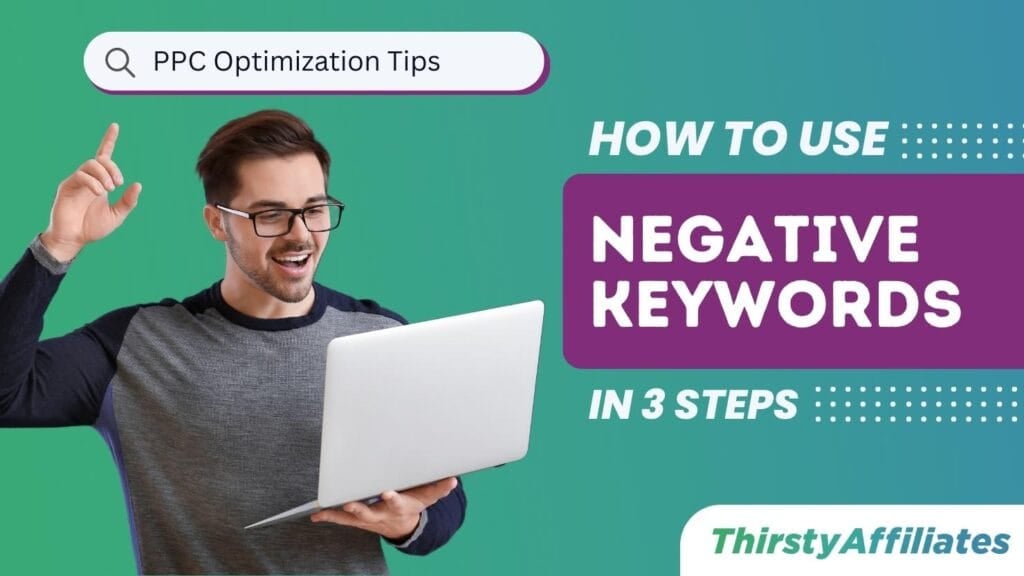
No cenário competitivo da publicidade pay-per-click, cada clique conta. Você precisa garantir que seus anúncios acertem o alvo e evitar cliques irrelevantes que sugam sua carteira.
É aí que palavras-chave negativas entram em ação. Ao usar esses recursos estrategicamente, você pode turbinar suas campanhas, economizar muito dinheiro e obter o máximo de retorno possível.
Neste guia abrangente, nós o orientaremos no processo de identificação e implementação eficaz de palavras-chave negativas. Você descobrirá como refinar sua segmentação, reduzir o desperdício de gastos com anúncios e atrair apenas os leads mais qualificados para o seu site.
Vamos começar a trabalhar!
Uma introdução às palavras-chave negativas
A publicidade PPC é uma maneira fantástica de promover seu negócio on-line, especialmente se você for um comerciante afiliado. Ele permite que você segmente o público-alvo desejado e pague somente quando alguém realmente se envolver com seu anúncio.
No entanto, o objetivo não é apenas aumentar os cliques. Você também quer que esses cliques se transformem em conversões. O uso de palavras-chave negativas pode ajudar nesse sentido.
As palavras-chave negativas são essencialmente termos de pesquisa que não têm relevância para sua marca. Ao incorporá-las às suas campanhas de PPC, você pode melhorar a qualidade das pesquisas e dos cliques filtrando as consultas que não têm nada a ver com a sua empresa.
Assim como você pode dar lances para palavras-chave específicas em plataformas como Anúncios do Google (anteriormente conhecido como Google AdWords), você também pode adicionar palavras-chave negativas à sua lista. Isso permite que os mecanismos de pesquisa saibam para quais termos você não quer que seu anúncio seja exibido.
Por exemplo, digamos que você seja um profissional de marketing afiliado especializado em produtos de tecnologia. Ao incluir "reparo" como uma palavra-chave negativa, você pode impedir que seu anúncio apareça em pesquisas relacionadas a serviços de reparo técnico.
O resultado final é que as palavras-chave negativas aumentam a eficiência e a eficácia de sua estratégia de marketing. Chega de desperdiçar seu orçamento em cliques que não convertem porque o lead foi enganado pelos resultados da pesquisa.
Como usar palavras-chave negativas para otimizar suas campanhas de PPC (em 3 etapas)
Agora que você entende o que são palavras-chave negativas, pode começar a usá-las em suas campanhas de PPC. Aqui estão três etapas simples para fazer exatamente isso.
Etapa 1: Faça um brainstorming de uma lista de palavras-chave negativas
Coloque sua cabeça para pensar e comece a fazer uma lista de palavras-chave que não estejam relacionadas ao seu produto ou serviço.
Use o Google
Para dar o pontapé inicial em sua jornada de palavras-chave negativas, comece fazendo uma pesquisa no Google por produtos e serviços semelhantes aos seus. Observe atentamente os resultados da pesquisa, prestando atenção nos anúncios e listagens que incluem termos relevantes para sua campanha, bem como naqueles que não incluem.
Vamos elaborar nosso exemplo de tecnologia e gadgets. Digamos que você promova tecnologia de ponta, inclusive câmeras digitais de última geração. Durante a sua pesquisa, você pode encontrar palavras-chave relacionadas a serviços de reparo de câmeras, tutoriais sobre câmeras ou análises de câmeras.
Agora, o problema é o seguinte: as pessoas que estão pesquisando esses termos provavelmente não estão procurando uma nova câmera. Portanto, é aconselhável adicionar essas palavras-chave à sua lista de palavras-chave negativas. Ao fazer isso, você garantirá que seus anúncios fiquem longe dos resultados de pesquisa que provavelmente não levarão à venda de câmeras.
Encontre listas de palavras-chave negativas universais
O objetivo da publicidade PPC é atingir indivíduos que estão prontos para comprar seu produto, de preferência aqueles que estão perto do final do funil de vendas.
Para filtrar as pessoas que simplesmente não estão no mercado para seus produtos, é bom incluir palavras-chave negativas universais em sua lista - ou seja, palavras-chave que devem ser praticamente sempre evitadas pelos anunciantes de PPC
WebMechanix é um ótimo recurso que oferece insights e orientações valiosas sobre a seleção e a implementação de palavras-chave negativas.
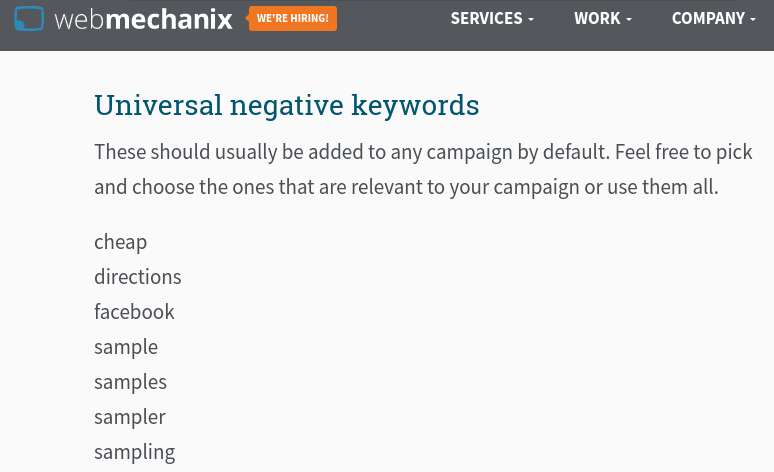
Verifique seu relatório de consulta de pesquisa
Outra maneira de lidar com a pesquisa de palavras-chave negativas é acessar sua conta do Google Ads e verificar o Relatório de consultas de pesquisa. Esse prático relatório mostra os termos de pesquisa reais que estão acionando seus anúncios.
Para acessar esse relatório, vá para sua conta do Ads e clique em Campanhas no canto superior esquerdo. Em seguida, navegue até Palavras-chave > Termos de pesquisa:
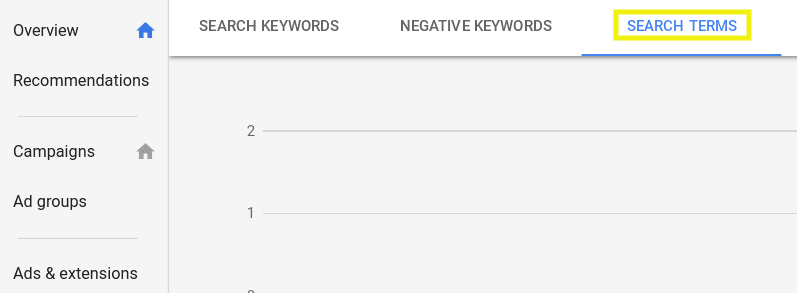
A partir daí, você pode analisar os dados para ver quais anúncios estão obtendo o maior número de impressões, conversões e taxas de cliques (CTRs).
Se você perceber que determinados termos não estão convertendo bem, talvez seja aconselhável adicioná-los à sua lista de palavras-chave negativas. Dessa forma, você pode alocar seu orçamento para opções mais lucrativas e aproveitar ao máximo seus esforços de publicidade. Tudo se resume a otimizar e maximizar seu ROI!
Etapa 2: Adicionar palavras-chave negativas ao Google Ads
Quando tiver sua lista de palavras-chave negativas, você precisará formatá-la para o Google Ads.
Para fazer isso, coloque cada palavra ou frase entre colchetes com um hífen na frente. Continuando com nosso exemplo de comerciante afiliado de tecnologia, a lista ficaria mais ou menos assim:
-[Sumsung troubleshooting]
-[Atacado Apple Watches].
-[Tubarão Negro de segunda mão 4]
-[Reparo ASUS]
Agora é hora de adicioná-los!
- No painel de controle de sua conta do Google Ads, clique na guia Ferramentas e configurações ícone de chave inglesa na barra de menu superior.
- Em seguida, clique em Listas de palavras-chave negativas sob Biblioteca compartilhada
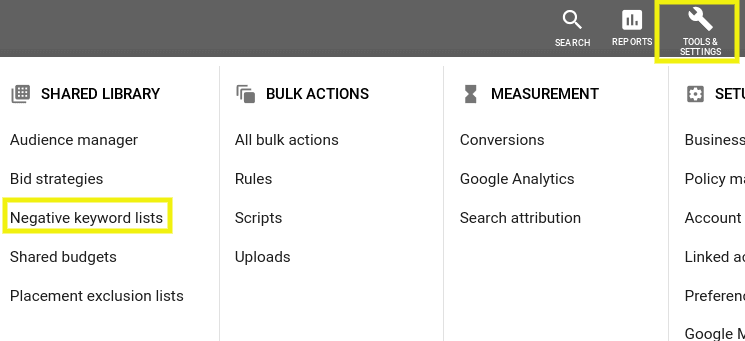
- Selecione o sinal de adição azul (+)que o levará a uma página na qual você poderá adicionar sua lista de palavras-chave negativas:
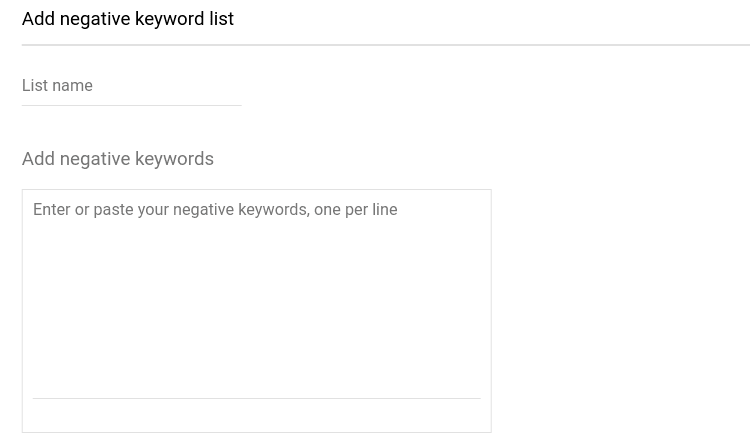
- Criar um nome para sua lista
- Cole suas palavras-chave no campo "Adicionar palavras-chave negativas".
- Quando terminar, clique em "Salvar“.
- Você pode aplicar palavras-chave negativas a uma única campanha ou a um grupo:

Depois que você atribuir as palavras-chave negativas a uma campanha ou grupo, nenhum anúncio nessas categorias será exibido para consultas de pesquisa que contenham esses termos.
Etapa 3: Revise e continue criando sua lista de palavras-chave negativas
Como em qualquer campanha de marketing, é importante revisar seus anúncios PPC regularmente. Em geral, recomenda-se que você os verifique pelo menos uma vez por semana. Usando os relatórios do Google Ads, o Google Analytics e o ferramentas de relatórios de marketing de afiliados pode ajudá-lo a ficar por dentro dos últimos desenvolvimentos em suas campanhas.
Por exemplo, com o ThirstyAffiliates, você pode acompanhar o desempenho de seus links de afiliados para ver quais têm bom desempenho e quais têm desempenho inferior.
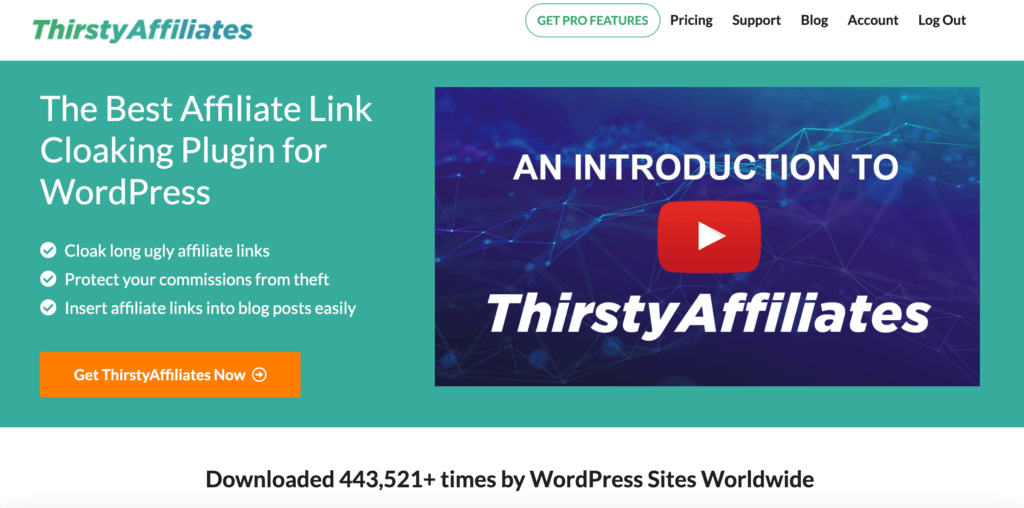
Isso permitirá que você identifique quais palavras-chave estão direcionando o tráfego para os links de baixo desempenho. Em seguida, você pode adicioná-las como palavras-chave negativas se acreditar que elas estão atraindo tráfego não qualificado ou irrelevante.
Além disso, você deve ficar atento a novos produtos, serviços e tendências em seu nicho. Ao identificar novos termos que não sejam relevantes para sua campanha, adicione-os à sua lista de palavras-chave negativas.
Isso é especialmente importante se você estiver em um campo em rápida evolução, no qual novos produtos e palavras-chave surgem constantemente.
Além de suas próprias descobertas, considere o uso de ferramentas que sugerem palavras-chave negativas com base no seu setor e nas palavras-chave que você já está usando.
Algumas ferramentas de gerenciamento de PPC oferecem recursos para ajudar a identificar possíveis palavras-chave negativas. Ferramentas como SEMrush e do Google Planejador de palavras-chave pode fornecer insights sobre quais palavras-chave são populares em seu nicho e podem gerar tráfego irrelevante.
Lembre-se de que uma campanha bem otimizada é um processo contínuo, não uma configuração única. O gerenciamento de sua lista de palavras-chave negativas deve ser um processo contínuo.
Para atualizar suas palavras-chave negativas no Google Ads, basta acessar Ferramentas e configurações > Listas de palavras-chave negativas. Em seguida, clique no ícone sinal de adição azul (+) para adicionar uma nova palavra-chave negativa, conforme descrito na Etapa 2:
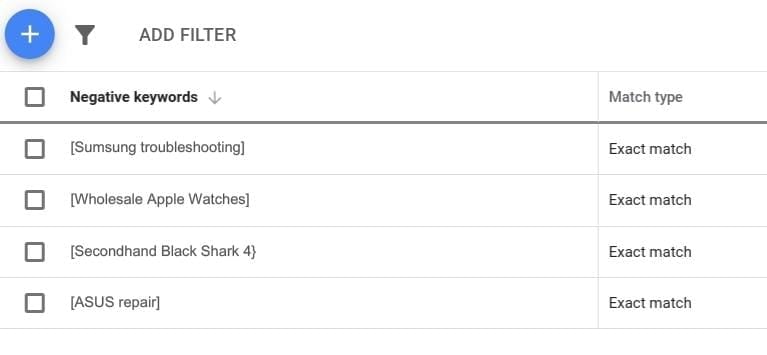
Continue criando sua lista de palavras-chave negativas para aumentar a qualidade do tráfego que seus anúncios atraem. Por sua vez, isso aumentará suas taxas de conversão e a eficácia de seu orçamento de PPC.
Conclusão
Aparecer em pesquisas irrelevantes pode desperdiçar seu orçamento de PPC com usuários que não estão interessados em converter. Para tirar o máximo proveito de seus anúncios, considere os termos de pesquisa para os quais você não quer que eles sejam classificados.
Aqui está uma recapitulação das etapas simples que você pode seguir para otimizar suas campanhas de PPC, encontrando e usando palavras-chave negativas:
- Faça um brainstorming de uma lista de palavras-chave negativas por meio de pesquisa.
- Adicione suas palavras-chave negativas a Anúncios do Googlee aplicá-las no nível do grupo de anúncios ou da campanha.
- Revise e desenvolva continuamente sua lista de palavras-chave negativas.
Você tem alguma dúvida sobre o uso de palavras-chave negativas?? Deixe-nos saber na seção de comentários abaixo!
Se você gostou deste post, não deixe de nos seguir em Twitter, Instagram, Facebook, Pintereste LinkedIn! E não se esqueça de assinar nosso boletim informativo!



Seus gastos com PPC podem ser desperdiçados com pessoas que não estão interessadas em converter se você aparecer em pesquisas sem sentido. Pense nos termos de pesquisa para os quais você não quer que seus anúncios sejam classificados para obter o máximo deles.
Insights valiosos sobre palavras-chave negativas! Este artigo fornece dicas práticas para otimizar campanhas de PPC, reduzir cliques irrelevantes e aumentar o ROI. Uma leitura obrigatória para os profissionais de marketing!
Obrigado por esse artigo muito bom. Como iniciante, eu realmente aprecio postagens como essa. SEO é a informação mais recente que deve ser dominada
Eu não sabia que havia uma lista universal de palavras-chave negativas. Obrigado por listar o WebMechanix como um recurso para encontrar essas palavras-chave negativas comuns.
Estou marcando esse link como favorito agora. É uma boa leitura para mim.
O uso de palavras-chave negativas em suas campanhas de publicidade on-line é uma estratégia crucial para otimizar sua segmentação e garantir que seus anúncios atinjam o público mais relevante. As palavras-chave negativas permitem que você exclua determinados termos de pesquisa do acionamento de seus anúncios, ajudando-o a refinar sua campanha e a melhorar seu desempenho.
Olá, adorei seu artigo.
Quais são os benefícios do uso de palavras-chave negativas em campanhas de publicidade pay-per-click (PPC) e como elas podem ajudar a otimizar a eficácia de seus anúncios em termos de segmentação do público-alvo certo e maximização das taxas de conversão?
-RobinEsson
Boa leitura! Preciso melhorar o SEO do meu site, então vou tentar isso
Esta é uma postagem informativa que destaca o valor das palavras-chave negativas para melhorar o desempenho da pesquisa orgânica e paga. Com certeza adicionarei algumas palavras-chave negativas às minhas próprias campanhas com base nessa orientação.
Obrigado por fornecer informações valiosas para nós.
Essa lista realmente ajudou, muito obrigado
Ótimo artigo para todos. Muito obrigado por compartilhar esse artigo. Eu adorei.
Obrigado por compartilhar esse conteúdo valioso e espero ler mais sobre seu trabalho no futuro!
Acompanho seu blog há algum tempo e gostaria de expressar minha gratidão. Suas postagens sempre fornecem informações valiosas e dicas práticas. Essa postagem específica sobre palavras-chave não foi exceção. Obrigado por sua dedicação em compartilhar conteúdo de qualidade!
Ótimo artigo! O uso de palavras-chave negativas é fundamental para otimizar as campanhas de PPC. Sua abordagem em três etapas simplifica o processo de forma eficaz. O monitoramento e a atualização regulares das palavras-chave negativas são essenciais para o sucesso. Obrigado por suas valiosas percepções! Espero receber mais conteúdo informativo de sua parte.
O site do seu blog nos forneceu informações úteis para usarmos. Todas as recomendações em seu site são incríveis. Muito obrigado por falar sobre isso.
Excelente artigo sobre palavras-chave negativas! Como profissional de marketing afiliado, entendo a importância de refinar e otimizar minha estratégia de palavras-chave, e esta postagem fornece orientações claras e concisas sobre como aproveitar as palavras-chave negativas de forma eficaz.
Gostaria de expressar minha gratidão. Suas postagens sempre fornecem informações valiosas e dicas práticas. Essa postagem específica sobre palavras-chave não foi exceção. Obrigado por sua dedicação em compartilhar conteúdo da melhor qualidade!
Ele é muito útil para mim. Embora pareça bonito, eu realmente gostaria que alguns desses autores de mega plugins considerassem a acessibilidade como uma prioridade ou até mesmo uma consideração. Embora quase todos os países tenham algum tipo de diretriz de acessibilidade, nenhum desses desenvolvedores parece dar a mínima importância à acessibilidade. A navegação é muito importante.
Ótimo blog. Aprender sobre palavras-chave negativas e como usá-las de forma eficaz em campanhas de PPC é crucial para o sucesso das campanhas de anúncios. Obrigado pelas dicas valiosas. Aprendi algumas coisas novas.
Obrigado por fornecer informações valiosas e nos ajudar a aprender mais.
Fantástico guia sobre a utilização de palavras-chave negativas para turbinar as campanhas de PPC! Seus insights são muito precisos e com certeza ajudarão a aumentar a eficiência da campanha. Obrigado pelas dicas práticas!
Obrigado por compartilhar informações valiosas e nos ajudar.
Saúde!
O uso de palavras-chave negativas é um aspecto crucial da otimização de suas campanhas de PPC (Pay-Per-Click), pois elas ajudam a refinar sua segmentação e evitam que seus anúncios apareçam em pesquisas irrelevantes. Esse artigo é muito útil para todos os profissionais da área digital
Isso é algo que vale a pena compartilhar. Eu não tinha ideia de como usar essas palavras-chave. Obrigado por compartilhar esse conteúdo excelente e continuarei a segui-lo para obter mais atualizações como essa.
Eu estava literalmente procurando por esse tópico, obrigado por compartilhar
Obrigado por compartilhar informações valiosas e nos ajudar.
Saúde!
Como alguém que tem se esforçado para ajustar minhas campanhas de PPC, sua orientação sobre o uso estratégico de palavras-chave negativas foi um divisor de águas. Apreciei especialmente os exemplos práticos que você forneceu - eles realmente me ajudaram a entender o conceito e seu possível impacto no desempenho da campanha.
A elaboração de campanhas PPC eficazes exige precisão. Este guia sobre o aproveitamento de palavras-chave negativas é um divisor de águas. Ele navega brilhantemente pela arte de filtrar cliques irrelevantes e preservar o orçamento. Como alguém que está se aprofundando no marketing digital, as etapas acionáveis e os exemplos do mundo real ressoam. Estou animado para usar essa técnica e otimizar as conversões de anúncios!
Deparei-me com este artigo enquanto navegava na Internet e devo dizer que foi uma surpresa agradável. A profundidade das informações fornecidas é realmente louvável. Excelente trabalho!
Até agora, não estou usando palavras-chave negativas em minha campanha, pois achei que isso seria prejudicial para minha campanha. Obrigado por me orientar.
Descobri que esse guia é uma ferramenta inestimável que desmistifica o aspecto frequentemente negligenciado do gerenciamento de palavras-chave. É uma leitura obrigatória para os profissionais de marketing que desejam ajustar suas campanhas e obter o máximo de retorno para seu investimento em publicidade.
Sua explicação perspicaz sobre as consequências dos campos públicos acrescenta uma profundidade valiosa ao tópico. Excelente trabalho!
Este guia é um tesouro abrangente para anunciantes de PPC! Ele revela com elegância o poder das palavras-chave negativas, permitindo uma segmentação mais precisa e economia de custos. Uma leitura obrigatória para otimizar campanhas publicitárias.
Guia fantástico sobre a otimização de campanhas de PPC com palavras-chave negativas. Muitas vezes, não se percebe o poder que as palavras-chave negativas podem ter para refinar a segmentação e reduzir o desperdício de gastos com anúncios. O detalhamento em três etapas que você forneceu é muito claro e prático. A implementação dessas estratégias realmente fez a diferença em minhas campanhas, resultando em cliques de maior qualidade e melhor ROI. Obrigado por compartilhar sua experiência! Espero receber mais insights como esses.
Olá, agradeço as informações. Elas são muito compreensíveis e claras.
A maneira como você está explicando é fantástica e será útil para a publicidade
Obrigado por este artigo muito bom. Como iniciante, eu realmente aprecio posts como Seo, PPC, Social Media Marketing, muito obrigado
bom blog, continue inspirando o uso
Não tenho palavras para dizer, mas simplesmente posso dizer muito obrigado por esse artigo tão informativo. Aprenderei mais com você e meu negócio começará.
O conteúdo é incrivelmente informativo, detalhando conceitos complexos com facilidade. É a minha referência para me manter atualizado sobre as tendências tecnológicas e aprender dicas práticas. Seu compromisso com o compartilhamento de conhecimento é altamente louvável!
Para usar palavras-chave negativas para otimizar suas campanhas de PPC em três etapas:
Pesquisa de palavras-chave: Identifique as palavras-chave que são relevantes para sua campanha, mas que podem atrair tráfego irrelevante. Essas são as palavras-chave que você deseja excluir.
Adicionar palavras-chave negativas: Em sua plataforma de PPC (por exemplo, Google Ads), vá para as configurações da campanha e adicione essas palavras-chave negativas à campanha ou ao grupo de anúncios. Isso informa à plataforma para não exibir seus anúncios quando esses termos estiverem presentes.
Monitore e refine: Analise regularmente o desempenho de sua campanha. Se você ainda notar cliques irrelevantes ou custos altos para determinadas palavras-chave, ajuste sua lista de palavras-chave negativas de acordo. Esse refinamento contínuo ajuda a otimizar sua campanha ao longo do tempo.
Quando procuro uma palavra-chave, encontro algumas palavras que não quero usar em meu blog. Entretanto, depois de ler este artigo, tenho algumas ideias para escrever sobre esses tópicos. Por exemplo, você pode pedir às pessoas que "não façam isso".
Muito obrigado por esse texto maravilhoso. O mundo é lindo se ajudarmos uns aos outros.
Obrigado e cumprimentos.
Muito obrigado por esse artigo incrível. Suas ideias são absolutamente fantásticas. Realmente úteis para os iniciantes em web design
Nunca pensei em palavras-chave negativas de uma forma tão positiva.
Muito obrigado
Com certeza vou dar uma olhada, obrigado pelas dicas!
negativos são muito mais úteis para meus negócios.
ótimo trabalho, artigo muito informativo, obrigado
Ótimas informações bem descritas sobre palavras-chave negativas
As palavras-chave negativas são um componente essencial de qualquer campanha de PPC bem-sucedida. Seguindo essas três etapas para implementá-las de forma eficaz, você pode economizar dinheiro, melhorar as taxas de cliques e garantir que seus anúncios atinjam o público certo. Não subestime o poder das palavras-chave negativas para refinar sua estratégia de publicidade!
Ótimo artigo! Gostei especialmente da maneira como você explicou os diferentes tipos de palavras-chave negativas e como usá-las de forma eficaz. Também agradeço pelo guia passo a passo para adicionar palavras-chave negativas às campanhas do Google Ads.
As palavras-chave negativas são essenciais para o sucesso do PPC. Essas três técnicas podem economizar seu dinheiro, aumentar as taxas de cliques e direcionar o público-alvo correto para seus anúncios. As palavras-chave negativas podem melhorar sua estratégia de publicidade!
A otimização de palavras-chave negativas geralmente é um aspecto negligenciado, mas essencial, de qualquer campanha de PPC bem-sucedida. Sua postagem no blog esclareceu a importância de selecionar cuidadosamente essa lista para maximizar a eficiência dos gastos com anúncios. É incrível como as palavras-chave negativas certas podem filtrar o tráfego irrelevante e melhorar a qualidade dos leads. As dicas práticas e os exemplos que você forneceu são especialmente úteis para entender como abordar esse aspecto do gerenciamento de palavras-chave. Obrigado por compartilhar essas informações valiosas; elas mudam o jogo para qualquer pessoa que esteja se esforçando para tornar suas campanhas de PPC mais econômicas e orientadas para a conversão
Conteúdo muito informativo para palavras-chave negativas.
você pode economizar seu custo de campanhas usando palavras-chave negativas.
Postagem bem pesquisada e informativa. Artigo realmente útil e excelente sobre palavras-chave negativas, seus tipos e como elas ajudam no sucesso do PPC. Obrigado por compartilhar.
Adoro como você divide tópicos complexos em conceitos fáceis de entender. Excelente trabalho!
Seu blog é como uma bússola que me guia pelo mar de informações. Indispensável!
Uau, esse artigo realmente abriu meus olhos para uma nova perspectiva. Obrigado por compartilhar!
O guia de três etapas sobre o uso de palavras-chave negativas para otimizar as campanhas de PPC é perspicaz e prático. A explicação é clara, facilitando a implementação dessas estratégias tanto para iniciantes quanto para profissionais de marketing experientes. A ênfase no refinamento da segmentação de anúncios e na minimização de cliques irrelevantes é crucial para a relação custo-benefício.
Obrigado pelas informações valiosas,
Ótimo compartilhamento !!!
Hi;
Você tem uma perspectiva única que é revigorante de se ler.
Este guia é muito informativo e a melhor parte é que ele não está vendendo ferramentas de assinatura caras. São coisas simples que as pessoas podem fazer sem muito investimento. Muito obrigado!
As percepções compartilhadas aqui são realmente novas e cativantes. Já faz algum tempo que não me deparo com uma análise tão profunda. Obrigado por compartilhar.
Obrigado por essa postagem tão informativa. Isso é ótimo para atrair o público para nosso blog/site. Ótimo conceito.
Seu guia sobre o uso de palavras-chave negativas para otimizar as campanhas de PPC em três etapas é um divisor de águas! O detalhamento passo a passo é super prático. Tenho tido dificuldades para refinar minhas campanhas, e seus insights são muito oportunos. Como você viu o impacto das palavras-chave negativas em seu próprio desempenho de PPC? Estou ansioso para experimentar!
Não tenho a menor ideia sobre a campanha PPC. Aprendi tudo com sua postagem no blog.
Insights brilhantes sobre como aproveitar o poder das palavras-chave negativas para turbinar as campanhas de PPC! Seu guia passo a passo é incrivelmente prático e esclarece uma faceta da otimização de PPC que geralmente é negligenciada.
Não poderia concordar mais com a importância da pesquisa completa de palavras-chave. Identificar e categorizar palavras-chave negativas é um divisor de águas no refinamento da segmentação e na garantia de que os gastos com anúncios sejam direcionados ao público mais relevante. A analogia de esculpir o excesso para revelar a obra-prima é perfeita!
Brilhante análise! Seu artigo sobre "Como usar palavras-chave negativas para otimizar suas campanhas de PPC" em três etapas é um divisor de águas. O guia passo a passo, desde a identificação de termos irrelevantes até sua implementação estratégica, é incrivelmente perspicaz. As palavras-chave negativas costumam ser subestimadas, e sua ênfase no poder delas para refinar a segmentação e melhorar o ROI é perfeita. Obrigado por simplificar o processo e fornecer dicas práticas. Estou animado para implementar essas estratégias e levar minhas campanhas de PPC para o próximo nível.